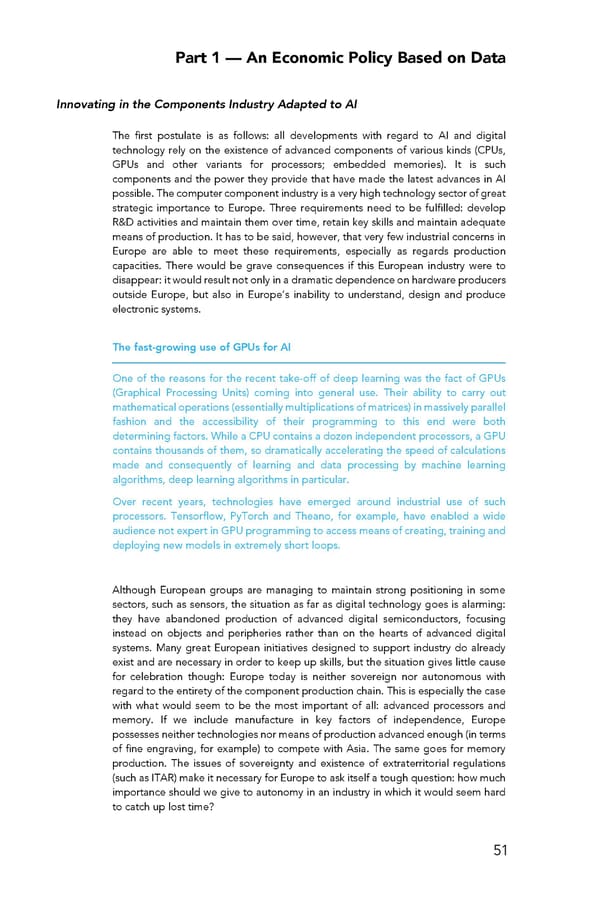Part 1 — An Economic Policy Based on Data Innovating in the Components Industry Adapted to AI The first postulate is as follows: all developments with regard to AI and digital technology rely on the existence of advanced components of various kinds (CPUs, GPUs and other variants for processors; embedded memories). It is such components and the power they provide that have made the latest advances in AI possible. The computer component industry is a very high technology sector of great strategic importance to Europe. Three requirements need to be fulfilled: develop R&D activities and maintain them over time, retain key skills and maintain adequate means of production. It has to be said, however, that very few industrial concerns in Europe are able to meet these requirements, especially as regards production capacities. There would be grave consequences if this European industry were to disappear: it would result not only in a dramatic dependence on hardware producers outside Europe, but also in Europe’s inability to understand, design and produce electronic systems. The fast-growing use of GPUs for AI One of the reasons for the recent take-off of deep learning was the fact of GPUs (Graphical Processing Units) coming into general use. Their ability to carry out mathematical operations (essentially multiplications of matrices) in massively parallel fashion and the accessibility of their programming to this end were both determining factors. While a CPU contains a dozen independent processors, a GPU contains thousands of them, so dramatically accelerating the speed of calculations made and consequently of learning and data processing by machine learning algorithms, deep learning algorithms in particular. Over recent years, technologies have emerged around industrial use of such processors. Tensorflow, PyTorch and Theano, for example, have enabled a wide audience not expert in GPU programming to access means of creating, training and deploying new models in extremely short loops. Although European groups are managing to maintain strong positioning in some sectors, such as sensors, the situation as far as digital technology goes is alarming: they have abandoned production of advanced digital semiconductors, focusing instead on objects and peripheries rather than on the hearts of advanced digital systems. Many great European initiatives designed to support industry do already exist and are necessary in order to keep up skills, but the situation gives little cause for celebration though: Europe today is neither sovereign nor autonomous with regard to the entirety of the component production chain. This is especially the case with what would seem to be the most important of all: advanced processors and memory. If we include manufacture in key factors of independence, Europe possesses neither technologies nor means of production advanced enough (in terms of fine engraving, for example) to compete with Asia. The same goes for memory production. The issues of sovereignty and existence of extraterritorial regulations (such as ITAR) make it necessary for Europe to ask itself a tough question: how much importance should we give to autonomy in an industry in which it would seem hard to catch up lost time? 51
 For a Meaningful AI - Report Page 51 Page 53
For a Meaningful AI - Report Page 51 Page 53